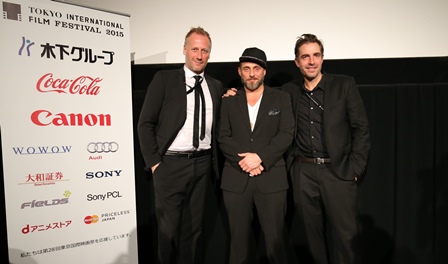
The Danish film, Land of Mine, is about a historical episode that most people aren’t aware of. Denmark was occupied by the Nazis during World War II, and left 2.2 million land mines behind the country when they were eventually defeated. In the film’s opening scene, Sergeant Carl Leopold Rasmussen (Roland Møller) is seen roughing up some German prisoners-of-war who he thinks are not marching to their destination fast enough. Rasmussen’s hatred of his former enemy is uncompromising in its violence, which becomes all the more disturbing as you realize that every one of these POWs is a teenage boy.
That’s another fact of the war that has generally gone unremarked. By the end of the conflict, the combatants had become younger and younger due to attrition. The men they were fighting didn’t distinguish between these kids and their older compatriots, but it was obvious that most were not prepared for war, physically and certainly not psychologically. In any event, Rasmussen has no pity for them since he obviously saw German soldiers do terrible things to his countrymen, and to his country.
That these boys were real is something the director, Martin Pieter Zandvliet, had to be careful with, and which is why he chose non-actors to play the 14 POWs depicted in the movie. “I wanted them to be themselves,” he said during the press conference following the screening. “I wanted them to be present in the moment, which is why I wrote back stories for all of them.”
The reason why it’s important is that the viewer is meant to sympathize with their situation, which was extraordinary and terrible. The Danish military used the POWs to dig up the mines, most of which were buried along the coastline. Rasmussen is put in charge of this one contingent of 14 boys, who are tasked with digging up 45,000 mines along a particular stretch of beach within a period of 3 months. Rasmussen promises them that they will be able to return home only when they finish the job, though, of course, he doesn’t guarantee that they will survive the work. “What’s left after a war is hatred and land mines,” said the director, trying to explain the psychological circumstances that inform the movie, at least in the beginning.
Thus, Land of Mine – whose English title has a clever double meaning that, in a way, belies its seriousness (the Danish title seems to be something along the lines of “Under the Sand”) – has suspense built into it from the moment the German boys start training. The viewer, of course, knows that someone will be blown up at some point. The only question is who and how many and when. And the viewer who has some experience with this sort of war movie will also rightly predict that Rasmussen and his charges will eventually bond, though in ways that he or she may not be able to predict so readily.
Møller, who wore a baseball cap in the flat-billed hip-hop style and exuded a hyperactive eagerness to please that contrasted starkly with his character on screen, explained that Rasmussen “always understood right from wrong,” and it was this understanding that invariably overwhelmed his hatred of the boys, who, while not entirely innocent, certainly didn’t deserve the same level of resentment that their elders did. And Zandvliet stressed that the movie, which is actually a Danish-German co-production, is meant to show the world that Danes are not “the happiest people in the world,” in spite of international media PR that suggests they are. The director obviously feels these boys were wrongly exploited, though he didn’t address the question of who, if not they, was going to remove all those land mines, because someone had to do it.
This dual national attitude – the country that saved Jews by helping them escape to Sweden while sending German adolescents to almost certain death after the war – is represented in the film by Rasmussen on the one hand, a man whose emotional volatility is eventually tempered by empathy, and his superior, Lt. Ebbe (Mikkel Boe Følsgaard), who, as Zandvliet pointed out, “represented the system,” and not just the Danish military system. Ebbe doesn’t care if the boys die and sees no obligation to repatriate them ever. The implication is that Ebbe is no better than the Nazis.
But if the movie’s themes and purposes – it doesn’t open in Denmark until early December – are very serious, the making of the film was apparently something of a lark. The three filmmakers – Zandvliet, Møller, and producer Mikael Christian Rieks – spoke at length about how much fun it was on set. Zandvliet had his whole family there on location. His daughter played a little girl who figures centrally in the movie’s most dramatically charged scene, and his wife, Camilla Hjelm Knudsen, was the cinematographer. A Japanese cinematographer who happened to be attending the press conference asked the director how that worked out. Didn’t he and his wife have fights? Møller, as a third person observer, confirmed that the couple “worked together very well” and never had an argument. Maybe Danes are the happiest people in the world.
[Philip Brasor]






















